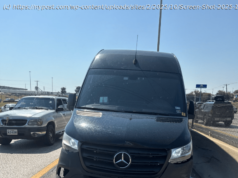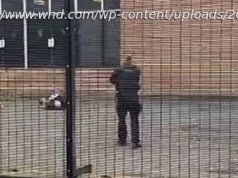
In recent tweets, Trump personally attacked James L. Robart, a U. S. district judge in Washington state, for putting “our country in such peril” with his ruling that temporarily blocked enforcement of the administration’s ban on all refugees as well as citizens of seven majority-Muslim countries from entering the United States.
“If something happens blame him and the court system. People pouring in. Bad!” Trump wrote in a tweet Sunday.
Then on Monday, Trump seemed to spread that blame to include news organizations. In a speech to the U. S. Central Command, the president accused the media of failing to report on some terrorist attacks for what he implied were nefarious reasons.
“ISIS is on a campaign of genocide, committing atrocities across the world,” Trump told commanders at MacDill Air Force Base in Tampa, using an acronym for the Islamic State terrorist group. He added: “You’ve seen what happened in Paris and Nice. All over Europe it’s happening. It’s gotten to a point where it’s not even being reported. And in many cases, the very, very dishonest press doesn’t want to report it. They have their reasons and you understand that.”
News organizations have reported extensively about terrorist attacks around the world, including the two in France mentioned by the president. Trump did not offer a single example of an attack that had gone unreported to support his accusation.
[ Opposition to Trump’s travel ban grows as key court decision looms ]
White House press secretary Sean Spicer sought to clarify Trump’s remarks, telling reporters traveling on Air Force One that the president believes some terrorist attacks have been “underreported.”
“He felt members of the media don’t always cover some of those events to the extent that other events might get covered,” Spicer said. “Protests will get blown out of the water, and yet an attack or a foiled attack doesn’t necessarily get the same coverage.”
Late Monday, the White House released a list of 78 terrorist attacks worldwide since September 2014, after the Islamic State declared its caliphate, and argued that “most” of them were not widely reported.
Carl Bildt, a former prime minister of Sweden, tweeted a response to Trump’s remarks: “Trump in Tampa speech claims that terror attacks ‘all over Europe’ are so frequent that media no longer reports them. That’s ludicrous.”
Trump’s terrorism blame-game is in keeping with how he ran his campaign, looking for scapegoats at nearly every turn. He often blamed his own failings — a poor debate performance or a gaffe or a primary loss — on the media or other perceived enemies, and he fed his own conspiracies that his adversaries were out to undermine him.
“Trump acts instinctively rather than strategically,” said David Frum, a senior editor at the Atlantic and a White House speechwriter under President George W. Bush who is sharply critical of Trump. “His instinct to pass blame is very strong. . .. I don’t know whether people will succumb to this.”
Trump’s approach is not without risk. He could come across to many Americans as thin-skinned if he skirts the responsibilities of being commander in chief and looks to assign blame to outside forces.
Jennifer Palmieri, a Democrat who served as communications director on Hillary Clinton’s 2016 presidential campaign and in the Obama White House, said Trump is using the tactics of authoritarian leaders.
“He’s behaving like a demagogue,” Palmieri said. “It’s chilling because the president of the United States should be responsible for keeping the American people safe but is seeking to preemptively blame a judge.”
She added: “If an attack happens on American soil when he’s commander in chief, then he’s responsible. It’s chilling to see the president of the United States almost wish for an attack for the purpose of blaming somebody else.”
In the days since Robart’s ruling last Friday night, Trump sent nine tweets about the judge and stoking fear that suddenly the door had been opened for terrorists to enter the country and cause “death & destruction.”
“The judge opens up our country to potential terrorists and others that do not have our best interests at heart. Bad people are very happy!” the president said in one tweet sent Saturday night.
[ ‘We’ll do better’: Trump’s White House tries to gain a sense of order amid missteps ]
In his commentary, Trump has ignored the screening measures and other counterterrorism precautions that have long been in place by U. S. customs and border officials.
Asked whether the White House had evidence of Islamic militants “pouring in” to the country, a phrase Trump used in at least two tweets, Spicer said only: “I’m not going to get into specific information that the president has.”
Trump’s comments came after one of his top White House aides invoked a nonexistent terrorist attack to justify Trump’s travel ban. Kellyanne Conway, who serves as counselor to the president, cited the “Bowling Green massacre” in an interview last week on MSNBC. She had been referring to attempts in 2011 by two Iraqi citizens, living in Bowling Green, Ky., to send weapons to al-Qaeda in Iraq. Conway later acknowledged her error and said she had misspoken by calling it a “massacre” instead of a terrorist plot.
Trump also sought to diminish the credibility of Robart, calling him a “so-called judge.” Although presidents at times critique judicial rulings, they rarely take personal swipes at individual members of the federal bench. Trump’s breach of protocol could have a chilling affect on the judiciary, which constitutionally rules independently of the executive branch.
Lawmakers of both parties took issue with Trump’s attack on Robart.
Домой
United States
USA — Events ‘If something happens’: Trump points his finger in case of a terrorist...






